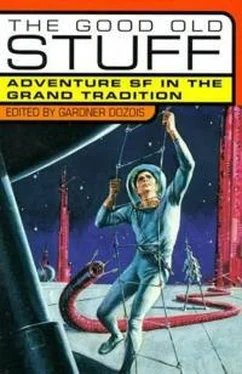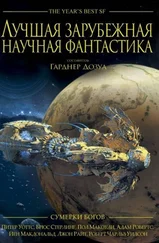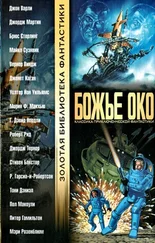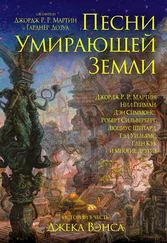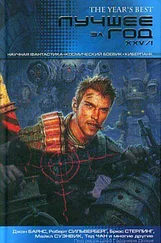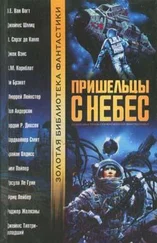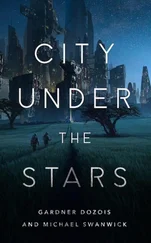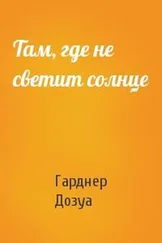Гарднер Дозуа - The Good Old Stuff
Здесь есть возможность читать онлайн «Гарднер Дозуа - The Good Old Stuff» весь текст электронной книги совершенно бесплатно (целиком полную версию без сокращений). В некоторых случаях можно слушать аудио, скачать через торрент в формате fb2 и присутствует краткое содержание. Год выпуска: 1998, ISBN: 1998, Издательство: St. Martin's Griffin, Жанр: Фантастика и фэнтези, на английском языке. Описание произведения, (предисловие) а так же отзывы посетителей доступны на портале библиотеки ЛибКат.
- Название:The Good Old Stuff
- Автор:
- Издательство:St. Martin's Griffin
- Жанр:
- Год:1998
- ISBN:0-312-19275-4
- Рейтинг книги:3 / 5. Голосов: 1
-
Избранное:Добавить в избранное
- Отзывы:
-
Ваша оценка:
- 60
- 1
- 2
- 3
- 4
- 5
The Good Old Stuff: краткое содержание, описание и аннотация
Предлагаем к чтению аннотацию, описание, краткое содержание или предисловие (зависит от того, что написал сам автор книги «The Good Old Stuff»). Если вы не нашли необходимую информацию о книге — напишите в комментариях, мы постараемся отыскать её.
The Good Old Stuff — читать онлайн бесплатно полную книгу (весь текст) целиком
Ниже представлен текст книги, разбитый по страницам. Система сохранения места последней прочитанной страницы, позволяет с удобством читать онлайн бесплатно книгу «The Good Old Stuff», без необходимости каждый раз заново искать на чём Вы остановились. Поставьте закладку, и сможете в любой момент перейти на страницу, на которой закончили чтение.
Интервал:
Закладка:
By the ‘90s, ironically enough, the erosion of the midlist by a changing publishing environment had driven Vance, once the King of the Paperback Shelves, out of mass-market altogether. Although much of Vance’s work is still in print, it’s largely available as expensive hardcovers from small-press specialty publishers such as Underwood-Miller (now known just as Charles IF. Miller, after the business partnership split up), who’ve made something of a pocket industry out of reprinting Vance novels (contact them at Charles IF. Miller, 708 Westover Drive, Lancaster, PA 17601, for a listing of Vance titles available); this is an ironic turnaround from the old days, when almost nothing by Vance was available in a hard-cover edition, but almost all of his titles were available in paperback—now, it’s just the reverse! Recently, Tor has been bringing some of Vance’s novels back into print in omnibus trade paperback editions, reprinting his “Demon Princes” series, for instance, in two omnibus volumes, and collecting three of his “Alastor” novels in the omnibus Alastor —the recent Night Lamp is also available as a trade paperback—and this may be the best and most cost-effective place to sample his work, although some of Vance’s old mass-market paperbacks still turn up fairly often in used-book stores.
Vance has won two Hugo Awards, a Nebula Award, two World Fantasy Awards (one the prestigious Life Achievement Award), a Grandmaster Nebula Award for Life Achievement, and the Edgar Award for best mystery novel.
His other books include The Palace of Love, City of the Chasch, The Dirdir, The Pnume, The Gray Prince, The Brave Free Men, Space Opera, Showboat World, Marune: Alastor 933, Wyst: Alastor 1716 , Lyonesse, The Green Pearl, Madouc, Araminta Station, Ecce and Olde Earth , and Throy , among many others. His short fiction has been collected in Eight Fantasms and Magics, The Best of Jack Vance, Green Magic, Lost Moons, The Complete Magnus Ridolph, The World Between and Other Stories, The Dark Side of the Moon , and The Narrow Land . His most recent books are the novels Night Lamp and Ports of Call .
Music, carnival lights, the slide of feet on waxed oak, perfume, muffled talk and laughter.
Arthur Caversham of twentieth-century Boston felt air along his skin, and discovered himself to be stark naked.
It was at Janice Paget’s coming-out party: three hundred guests in formal evening-wear surrounded him.
For a moment he felt no emotion beyond vague bewilderment. His presence seemed the outcome of logical events, but his memory was fogged and he could find no definite anchor of certainty.
He stood a little apart from the rest of the stag line, facing the red and gold calliope where the orchestra sat. The buffet, the punch bowl, the champagne wagons, tended by clowns, were to his right; to the left, through the open flap of the circus tent , lay the garden, now lit by strings of colored lights, red, green, yellow, blue, and he caught a glimpse of a merry-go-round across the lawn.
Why was he here? He had no recollection, no sense of purpose .... The night was warm; the other young men in the full-dress suits must feel rather sticky, he thought .... An idea tugged at a corner of his mind.
There was a significant aspect of the affair that he was overlooking.
He noticed that the young men nearby had moved away from him. He heard chortles of amusement, astonished exclamations. A girl dancing past saw him over the arm of her escort; she gave a startled squeak, jerked her eyes away, giggling and blushing.
Something was wrong. These young men and women were startled and amazed by his naked skin to the point of embarrassment. The gnaw of urgency came closer to the surface. He must do something. Taboos felt with such intensity might not be violated without unpleasant consequences; such was his understanding. He was lacking garments; these he must obtain.
He looked about him, inspecting the young men who watched him with ribald delight, disgust, or curiosity. To one of these latter he addressed himself.
“Where can I get some clothing?”
The young man shrugged. “Where did you leave yours?”
Two heavyset men in dark blue uniforms entered the tent; Arthur Caver-sham saw them from the corner of his eye, and his mind worked with desperate intensity.
This young man seemed typical of those around him. What sort of appeal would have meaning for him? Like any other human being, he could be moved to action if the right chord were struck. By what method could he be moved?
Sympathy?
Threats?
The prospect of advantage or profit?
Caversham rejected all of these. By violating the taboo he had forfeited his claim to sympathy. A threat would excite derision, and he had no profit or advantage to offer. The stimulus must be more devious .... He reflected that young men customarily banded together in secret societies. In the thousand cultures he had studied this was almost infallibly true. Long-houses, drug-cults, tongs, instruments of sexual initiation—whatever the name, the external aspects were near-identical: painful initiation, secret signs and passwords, uniformity of group conduct, obligation to service. If this young man were a member of such an association, he might react to an appeal to this group-spirit.
Arthur Caversham said, “I’ve been put in this taboo situation by the brotherhood; in the name of the brotherhood, find me some suitable garments.”‘ The young man stared, taken aback. “Brotherhood?... You mean fraternity?”‘ Enlightenment spread over his face. “Is this some kind of hellweek stunt?” He laughed. “If it is, they sure go all the way.”
“Yes,” said Arthur Caversham. “My fraternity.”
The young man said, “This way, then—and hurry, here comes the law.
We’ll take off under the tent. I’ll lend you my topcoat till you make it back to your house.”
The two uniformed men, pushing quietly through the dancers, were almost upon them. The young man lifted the flap of the tent, Arthur Caver-sham ducked under, his friend followed. Together they ran through the many-colored shadows to a little booth painted with gay red and white stripes that was near the entrance to the tent.
“You stay back, out of sight,” said the young man. “I’ll check out my coat,”
“Fine,” said Arthur Caversham.
The young man hesitated. “What’s your house? Where do you go to school?”
Arthur Caversham desperately searched his mind for an answer. A single fact reached the surface.
“I’m from Boston.”
“Boston U? Or MIT? Or Harvard?”
“Harvard.”
“Ah.” The young man nodded. “I’m Washington and Lee myself. What’s your house?”
“I’m not supposed to say.”
“Oh,” said the young man, puzzled but satisfied. “Well—just a minute .... “ Bearwald the Halforn halted, numb with despair and exhaustion.
The remnants of his platoon sank to the ground around him, and they stared back to where the rim of the night flickered and glowed with fire. Many villages, many wood-gabled farmhouses had been given the torch, and the Brands from Mount Medallion reveled in human blood.
The pulse of a distant drum touched Bearwald’s skin, a deep thrumrn-thrumm-thrumm, almost inaudible. Much closer he heard a hoarse human cry of fright, then exultant killing-calls, not human. The Brands were tall, black, man-shaped but not men. They had eyes like lamps of red glass, bright white teeth, and tonight they seemed bent on slaughtering all the men of the word.
“Down,” hissed Kanaw, his right arm-guard, and Bearwald crouched.
Across the flaring sky marched a column of tall Brand warriors, rocking jauntily, without fear.
Читать дальшеИнтервал:
Закладка:
Похожие книги на «The Good Old Stuff»
Представляем Вашему вниманию похожие книги на «The Good Old Stuff» списком для выбора. Мы отобрали схожую по названию и смыслу литературу в надежде предоставить читателям больше вариантов отыскать новые, интересные, ещё непрочитанные произведения.
Обсуждение, отзывы о книге «The Good Old Stuff» и просто собственные мнения читателей. Оставьте ваши комментарии, напишите, что Вы думаете о произведении, его смысле или главных героях. Укажите что конкретно понравилось, а что нет, и почему Вы так считаете.
